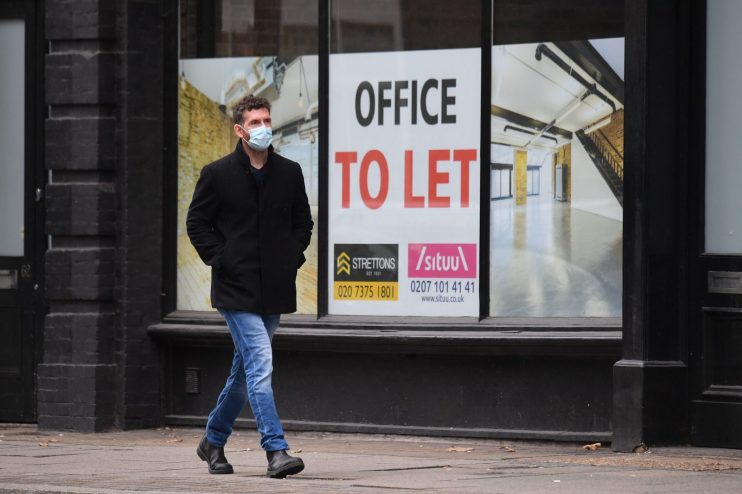UK economy: Experts cut forecast as coronavirus cases surge

Analysts have become significantly more pessimistic about the UK economy, saying the surge in coronavirus cases and new restrictions will weigh on the recovery as the year runs into 2021.
Economists say chancellor Rishi Sunak’s more generous employment support scheme will help limit some damage in the jobs market. But they warn that new lockdowns are bound to derail the fragile economic growth that was taking place.
The UK economy suffered a historic blow in the second quarter of the year, when the government curtailed normal life to try to stop the spread of coronavirus. GDP plunged 19.8 per cent, a record quarterly fall.
Yet the mood became more positive in the summer as coronavirus cases fell. The economy grew faster than expected in June and July, causing economists to slightly upgrade their forecasts for third-quarter and 2020 growth.
However, cracks started to show in August, when GDP growth undershot expectations by some distance. And then coronavirus cases began to soar, with the government putting swaths of the country under the toughest restrictions.
Institutions making forecasts in October predicted the economy would grow by just 1.7 per cent in the final three months of the year, a Treasury compilation showed earlier this month. That was down from an average prediction of 4.5 per cent in September.
“We’ve sharply slashed the fourth quarter number,” said Peter Dixon, senior economist at Commerzbank.
“It’s running at slightly less than one per cent at the moment. I think there are even question marks about that.”
The average October forecast was for the UK economy to shrink by 10.2 per cent in 2020. To put that in perspective, GDP contracted by 4.2 per cent in 2009 after the financial crisis and just under five per cent in 1945 at the end of World War II.
A sample of recent economic forecasts
| Q4 GDP | 2020 GDP | 2021 GDP | 2021 unemployment | |
|---|---|---|---|---|
| Barclays | 3.3% | -10% | 6.5% | 6.7% |
| Capital Economics | 1.3% | -10.4% | 6% | 6.8% |
| Commerzbank | 0.9% | -10.2% | 5.3% | 7.9% |
| EY Item Club | 1% | -10.1% | 6% | N/A |
| IMF | N/A | -9.8% | 5.9% | 7.4% |
| Pantheon Macro | 2.5% | -10% | 7.5% | 6% |
Unemployment could near 3m
Dixon said he thought Sunak’s latest stimulus measures would help the jobs market in the short term.
The chancellor beefed up the job support scheme that will replace furlough next month. Firms will now pay just five per cent towards missed hours, down from 33 per cent.
“Nonetheless, I think there will be quite a sharp spike in the unemployment rate,” Dixon said. He predicted it would rise to above eight per cent next year from 4.5 per cent currently. That would mean around 2.8m people out of work.
Economists at Capital Economics earlier this month predicted around 2.6m would be out of work by next year.
However, some forecasters are less pessimistic. Samuel Tombs, chief UK economist at Pantheon Macroeconomics, predicted the chancellor’s changes would mean unemployment was 6.5 per cent by the end of the year, compared to a previous estimate of 7.5 per cent.
“Most firms now will be better off keeping on as many staff as they can and spreading hours as thinly as possible,” he said in a recent note to clients.
Experts cut predictions for 2021 growth
Economists have also cut their forecasts for growth in 2021. Back in August, the Bank of England reckoned the UK economy would grow nine per cent next year after shrinking 9.5 per cent in 2020.
But recent predictions are far more pessimistic than that. The average forecast made in October was for the economy to grow 6.3 per cent next year, the Treasury compilation showed.
That would mean the UK takes longer to recover its pre-coronavirus size, causing more pain for businesses and households.
Ruth Gregory, senior UK economist at Capital Economics, said households and firms were likely to become “more reticent to spend due to the second wave”. She said this “may also keep GDP and inflation lower for longer and unemployment higher”.
Dixon said lower growth increased the chances there would be “scarring” on the economy. He said this would mean that the jobs people could normally “relatively easily pick up” in areas such as hospitality “just aren’t available anymore”.
Economists also stressed that there were big risks to their forecasts. Mark Gregory, EY chief economist, said: “While a vaccine could provide a positive boost, risks are weighted to the downside.
“A more significant outbreak of the virus during the winter months could plunge us back into lockdown with major implications for the economy.”
The EY Item Club’s forecast from earlier this month predicted the UK economy would not return to its pre-coronavirus size until the end of 2023.